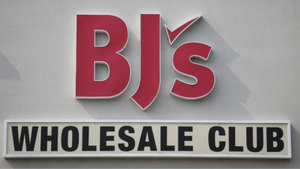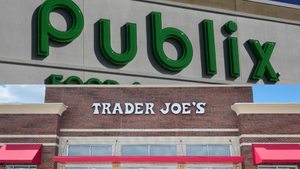Food distribution, retail businesses spur SpartanNash in Q2Food distribution, retail businesses spur SpartanNash in Q2
Dennis Eidson extends tenure as interim chief executive officer
August 13, 2020

SpartanNash posted double-digit gains in its food distribution and retail businesses in the second quarter, with earnings-per-share exceeding the top end of Wall Street’s projections.
Overall net sales for the quarter ended July 11 came in at $2.18 billion, up 9.4% from $2.00 billion a year earlier, the 17th straight quarter of sales growth, SpartanNash reported after yesterday’s market close. The Grand Rapids, Mich.-based grocery wholesaler and retailer attributed the increase primarily to higher sales to an upswing in consumer demand during the coronavirus demand in the retail and food distribution segments.
“The strength in the incremental sales volume in retail and food distribution, together with solid execution, growth in our second-quarter financial results continued to be ahead of our expectation,” Chairman, Interim President and CEO Dennis Eidson said in a conference call with analysts on Thursday.
“The operating environment and consumer behavior continues to evolve in response to the pandemic. Similar to the first quarter, we experienced higher sales volumes to the retailer,” he explained. “Retail consumer demand in our retail and food distribution segments was driven by a shift to more food-at-home consumption, in connection with federal and state guidelines as well as consumer concerns for personal safety.”

During the call, Eidson (left) announced that his interim status as SpartanNash’s chief executive is being extended. He took the reins as interim CEO last August with the exit of David Staples, who resigned after more than eight years in the post.
“The board of directors’ process to identify the next chief executive officer remains ongoing,” Eidson said. “In the meantime, the company and I have agreed to extend the term of my interim agreement for a period of up to an additional 90 days.”
In SpartanNash’s core food distribution business, which accounted for half of total company sales in the second quarter, net sales surged 16.5% to $1.09 billion from $935.4 million a year ago. Incremental volume gains from COVID-19-fueled demand and growth with existing customers lifted the segment’s sales for the period, SpartanNash said.
“Our supply chain teams continued to work around the clock to support the surge in sales volume resulting from the increased demand from our external customers as well as our own retail segment,” Eidson noted. “While operating in this current environment continues to test the capability of our supply chain operations, we’ve continued to leverage the partnerships with our suppliers and other distributors to support the efficient delivery of products to retail shelves.”
Retail segment sales climbed 10.8% to $631.3 million from $570 million in the second quarter, hoisted by customer stock-up purchases triggered by the COVID-19 outbreak. Same-store sales jumped 17.1%, partially offset by lower fuel prices and gallons sold, as well as store closures, according to SpartanNash.
“Our sales trend continued to be very strong in the beginning of the second quarter, with comparable sales [growth] of approximately 25% in the first period of the quarter. Our comp sales leveled throughout the remainder of the quarter and have somewhat stabilized in recent weeks into the low double digits,” Eidson said. “We are pleased to have continued to gain market share compared to the prior year for a second consecutive quarter, as consumers have gravitated towards trusted local supermarkets. We are proactively working to maintain new households we now serve by actively supporting consumers as their preferences evolve.”
Currently, SpartanNash operates 155 corporate-owned grocery stores in the Midwest, mainly under the Family Fare, Martin’s Super Markets, D&W Fresh Market, VG’s Grocery and Dan’s Supermarket banners.
E-commerce sales soared over 300%, and private-brand sales were up more than 24% for the quarter.
“This growth was driven by both new and existing customers, and e-commerce accounted for 5.6% of our sales in the locations where these solutions are offered,” Eidson said of the digital sales jump. “As I mentioned last quarter, we also increased staffing levels to accommodate the significant increase in the number of customers shopping online and are offering free same-day home delivery of prescription medications from our pharmacies. Private-label sales were also up over 24% as consumers look for quality products at a valued price or for alternatives to sometimes unavailable national brands. We believe our inviting store atmosphere and mix of fresh foods — along with local, national and private-label products — positions us well in the long term in the retail segment.”

Same-store sales for SpartanNash's corporate-operated stores jump over 17%.
Net sales for military distribution business declined 5.6% to $463 million from $490.6 million in the prior-year period. SpartanNash noted that growth in export sales were more than offset by the impact of domestic base access and commissary shopping restrictions due to COVID-19, which led to an overall decline of over 10% for the Defense Commissary Agency.
On the earnings side, net income (continuing operations) for the second quarter totaled $28.5 million, or 80 cents per diluted share, compared with a net loss of $6.8 million, or 19 cents per diluted share, in the 2019 quarter. SpartanNash improvement reflects increased operating earnings, lower interest expense and tax benefits from the Coronavirus Aid, Relief and Economic Security (CARES) Act. Adjusted earnings (continuing operations) were $26.1 million, or 73 cents per diluted share, versus $12.2 million, or 34 cents per diluted share, a year earlier.
Analysts, on average, had forecast adjusted earnings per share of 63 cents, with estimates ranging from a low of 59 cents to a high of 71 cents, according to Refinitiv/Thomson Reuters.
“The increase in profitability from the prior-year quarter was due to higher sales volume and increased leverage of operating expenses, particularly in retail store labor and certain fixed costs,” Chief Financial Officer Mark Shamber said in the call. “Significant increases in incentive compensation and a higher rate of supply-chain expenses served as just partial offsets to our increased profitability.”
For the 28-week first half, consolidated net sales rose 11% to $5.04 billion. Food distribution were up 16.9% to $2.1 billion, while retail segment sales advanced 11.2% to $1.41 billion. Military distribution sales dipped 0.5% to $1.17 billion from $1.16 billion in the year-ago period.
Looking ahead, SpartanNash raised its full-year earnings guidance, pointing to expected benefits from higher food-at-home consumption because of COVID-19, despite also acknowledging that the pandemic’s duration and magnitude remain uncertain.
For fiscal 2020, the company now projects reported EPS (continuing operations) of $2.13 to $2.41, up from its previous projection of $1.48 to $1.81. Adjusted EPS (continuing operations) is pegged at $2.40 to $2.60 versus the earlier estimate of $1.85 to $2.00.
Wall Street’s consensus forecast is for adjusted EPS of $2.07 for the full year, with projections running from $2.00 to $2.29, according to Refinitiv/Thomson Reuters.
For our most up-to-date coverage, visit the coronavirus homepage.
About the Author
You May Also Like






